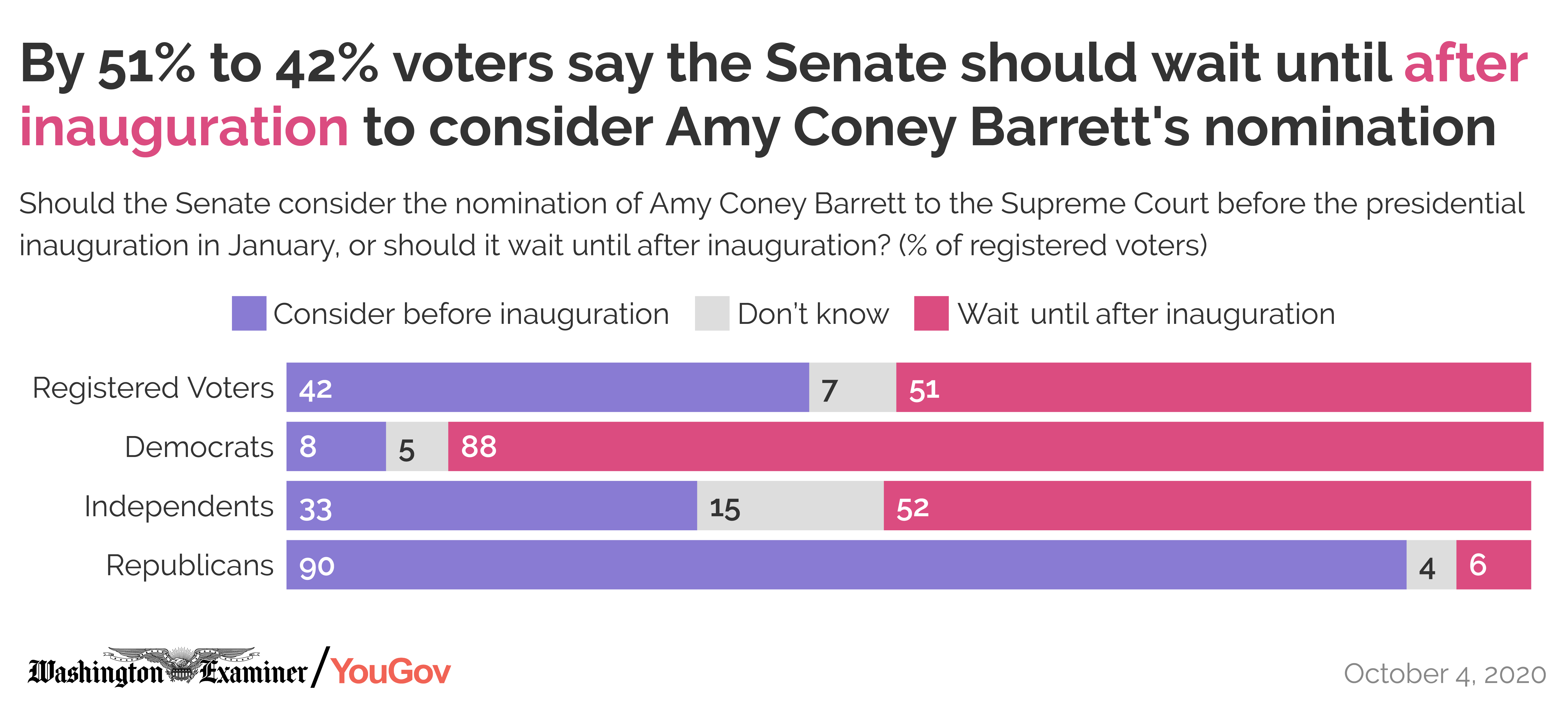Voters are split on whether to confirm a new Supreme Court justice before the presidential inauguration in January, with more wanting to wait than move full-steam ahead, a new poll has found.
A Washington Examiner/YouGov poll found that 51% would like to wait, compared to 42% who disagree. The Sunday survey of 1,200 registered voters has a margin of error of plus or minus 3.6 percentage points.

Voters largely broke down along partisan lines on the question when to confirm the next justice. Republicans want to proceed before the inauguration by 90% to 6%, while Democrats favor waiting by 88% to 8%.
An overwhelming majority said the Supreme Court nomination was important to their 2020 vote, including 84% of Republicans and 81% of Democrats. Overall, 58% considered it “very important” and another 21% “somewhat important.”
President Trump has nominated Judge Amy Coney Barrett to fill the vacancy created by the death of Justice Ruth Bader Ginsburg. Trump, on Monday, urged Senate Majority Leader Mitch McConnell, a Kentucky Republican, to “focus full time on approving my outstanding nominee to the United States Supreme Court.” The confirmation process is scheduled to begin this month.
Democrats counter that when Justice Antonin Scalia died in 2016, the McConnell-led Senate Republicans denied Judge Merrick Garland, President Barack Obama’s replacement nominee, a hearing for almost a year. After Trump defeated Democrat Hillary Clinton in that presidential election, the GOP-controlled Senate confirmed his nominee, Judge Neil Gorsuch, to fill the seat. Therefore, Democrats argued, a Ginsburg replacement should not be confirmed in an election year and the vacancy should be filled by whoever wins in November after they are inaugurated on Jan. 20.
Trump and McConnell contend the Garland precedent doesn’t apply because the same party controls both the Senate and the White House. Historically, justices have been nominated 29 times in an election year. Of these, 19 have occurred when the presidency and Senate are controlled by the same party, and 17 have been confirmed. Of the 10 justices nominated when the president and Senate are partisan opponents, only two have been confirmed.
“We won the election, and therefore, we have the right to choose her,” Trump said in the first presidential debate. “I’m not elected for three years, I’m elected for four years.” Democrats believe their nominee for the White House, former Vice President Joe Biden, is likely to win in November and would prefer he fill the vacancy.
“The American people have a right to have a say in who the Supreme Court nominee is, and that say occurs when they vote for United States senators and when they vote for the president of the United States,” Biden said in the debate. “They’re not going to get that chance now because we’re in the middle of an election already. The election has already started, tens of thousands of people have already voted.”
Liberal groups already regard the Gorsuch seat as “stolen” and will feel the same about Barrett succeeding Ginsburg. “Next January, when the Democrats win the Senate and we win the presidency, then we must abolish the filibuster, and we must begin a process to expand the Supreme Court because the Republicans will have stolen two Supreme Court justices,” Sen. Ed Markey, a Massachusetts Democrat, said in a press conference last month.
The Washington Examiner/YouGov poll also found that only a third of registered voters would support expanding the court and most would prefer ideological balance to ensuring a liberal majority.

